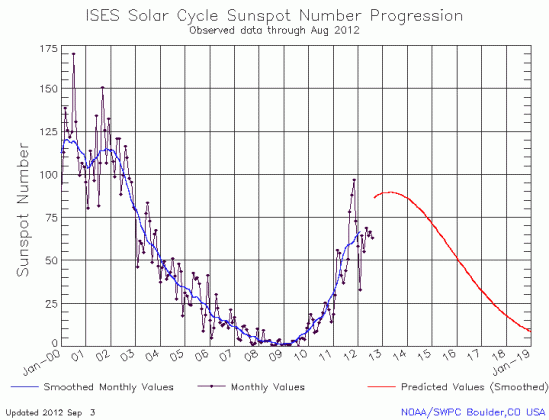And they call this a maximum?
NOAA today posted its monthly update of the ongoing sunspot cycle of the Sun. This latest graph, covering the month of August, is posted below the fold.
The Sun continues to fizzle.
The red line indicates the consensus (oh that word!) prediction of the solar scientist community from 2009. As you can see, except for a brief period in late 2011, the Sun has never come close to meeting their prediction. In August the sunspot number actually dropped slightly, even though the Sun is supposed to be moving up towards maximum.
Since February the solar scientists at the Marshall Space Flight Center have been predicting that the upcoming solar maximum will occur in the spring of 2013 and have a sunspot number of around 60, which would make this, as they say, “the smallest sunspot cycle in about 100 years.” They came to that number after much waffling in 2011, shifting their prediction from 59 up to 77, then up again to 99, and then finally back down to 60.
Based on the numbers in July and August, it would seem that the Marshall scientists have finally got it right. The sunspot number for this solar maximum seems settled around 60. Nonetheless, the shape of the graph makes me wonder if the maximum might have already occurred during that peak period late last year, rather then the predicted peak this upcoming spring.

On Christmas Eve 1968 three Americans became the first humans to visit another world. What they did to celebrate was unexpected and profound, and will be remembered throughout all human history. Genesis: the Story of Apollo 8, Robert Zimmerman's classic history of humanity's first journey to another world, tells that story, and it is now available as both an ebook and an audiobook, both with a foreword by Valerie Anders and a new introduction by Robert Zimmerman.
The print edition can be purchased at Amazon or from any other book seller. If you want an autographed copy the price is $60 for the hardback and $45 for the paperback, plus $8 shipping for each. Go here for purchasing details. The ebook is available everywhere for $5.99 (before discount) at amazon, or direct from my ebook publisher, ebookit. If you buy it from ebookit you don't support the big tech companies and the author gets a bigger cut much sooner.
The audiobook is also available at all these vendors, and is also free with a 30-day trial membership to Audible.
"Not simply about one mission, [Genesis] is also the history of America's quest for the moon... Zimmerman has done a masterful job of tying disparate events together into a solid account of one of America's greatest human triumphs."--San Antonio Express-News


It would be interesting to see the predictions from 2000-2011 on the chart above.
Take a look at the second graph on this NOAA page. It shows the predictions of the solar science community from April 2007. At that time the community was split between those who believed the upcoming maximum would be weak, and those who thought it would be strong. (Interestingly, the strong prediction crowd was led by David Hathaway, who is the main man at the Marshall Space Flight Center who now predicts a weak maximum.)
As it turns out, even the weak prediction was too strong.
Thanks.